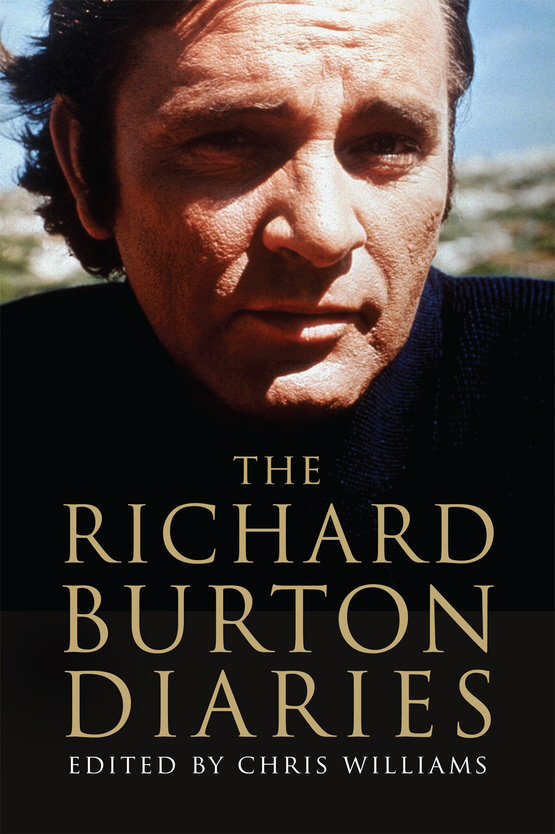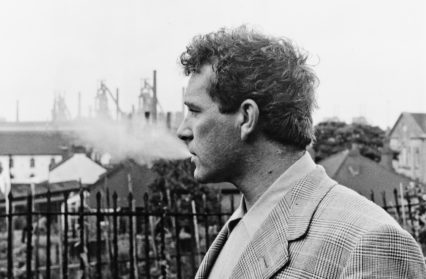James Lloyd reviews The Richard Burton Diaries, edited by Chris Williams, taking a look back at the Welsh actor’s life and temperament.
Sunday 16th October 1966. The village of Positano on the Amalfi Coast. Richard Burton is walking his Pekingese, E’en So, up a hill a short way from the Hotel Sirenuse, just one of the places he and Elizabeth Taylor – who is in their hotel room reading a book by Iris Murdoch – are staying whilst shooting The Taming of the Shrew (dir. Franco Zeffirelli). Burton stops traffic, literally, and turns back to the hotel feeling somewhat embarrassed.
Even this far into the diary, a mere 138 pages of 663 page book, readers will have deduced that Burton does not suffer fools gladly. He is dismissive of figures occupying the upper echelons of society, the society he himself inhabits (indeed, he is dismissive of his own talents and achievements throughout the diaries). He is frequently irascible, often preferring his own company and a book to that of his friends and family members. He is contradictory. He contemplates an imagined future when he might encounter money troubles and be unable to provide for his children. At the same time he discovers that in 20 months he has given $76,000 to one person and over $1,000,000 to another. ‘You have got to be an idiot’, says Burton.

Edited by Chris Williams
The aforementioned incident in Positano, of Burton’s presence even in the small municipality (whose population today is only 3,968) is relevant as it not only puts into context the stratospheric plane the Welshman occupies as the world’s most famous actor, but it also stimulates him to later write a brief note on fame in his diary, and in which he reveals the ‘famed people’ he admires. Among others, Burton cites, R.S. Gwynn, Dylan Thomas, Louis MacNeice, Stephen Spender and T.S. Eliot. And it is with the latter’s work, and from the opening line of East Coker, the second poem of Eliot’s Four Quartets, that perhaps sums up Burton’s life cycle:
“In my beginning is my end.”
Many of the reviews of Burton’s Diaries have focused on the second half of the Sixties and the nascent Seventies, when his affair and subsequent marriage and life with Elizabeth Taylor set the world on fire. Many of his teenage entries, which begin in December 1939 with the then 14 year old Richard Walter Jenkins recording the death of his aunt Cassie and ‘keeping notes on Richard II’, have been passed over. It is, however, absolutely fascinating (perhaps more so for a person who has grown up and is familiar with South Wales) to have the ‘monument’ that is Richard Burton reduced to a young boy gallivanting the streets and sports grounds of Port Talbot, where he lived for a majority of his early life until leaving for good at the age of 21.
“6 Saturday Went to see Cardiff beating Aberavon. Went to Cach in the night and saw… Afterwards went to Joe’s and had hot milk and chocolates. Had chips after.”
Meticulously edited by Chris Williams, a Professor of Welsh History at Swansea University, the introduction, various interludes and abundant footnotes work wonderfully to contextualise the periods Burton dedicated to making entries – there are of course a multitude of anecdotes and sub-plots attached to the Burton odyssey.
The teenage Richard Burton is competitive in almost everything and it is impossible not to see the ramifications of his youthful preoccupations in the man he would become. For example, his obsession with the board game Monopoly and his later predilection for purchasing a jet plane or piece of jewellery for Elizabeth on a whim and the frequent visits to the Cach (cinema). Or his competitiveness (which he would later imply was a particularly Welsh quality in an interview with Dennis Tuohy) in sports and in school exams can be seen in his conquest of women and outbidding Aristotle Onassis for the 69.42 carat, inch thick diamond from Cartier – a then record $1.1 million (’15 Sunday 1940 Determined to work hard at school and break all records…’) Most validating, however, for man with academic-leanings and renowned for his incredible voice, is a love of literature (‘23 Wednesday 1940 I am reading on average about 3 books in two days’) and his witnessing the oratory of G. Rees at his local chapel (‘three beautiful sermons’).
Together and in private, Burton and Taylor seem to resemble the brother and sister protagonists of Jean Cocteau’s Les Enfants Terrible (‘The Holy Terrors’). They construct a private world, one in which they can live out their unbridled fantasies, playing games where each hurls abuse at the other, with the feelings of dominance, anger and frustration that follow. Their love for each other is no doubt genuine, but they often appear to suffer ennui, not only with their profession, but with each other. It is surprise to learn of Burton and Taylor’s nerves before arriving on set for the first time and how alcohol above all else is a use to medicate this condition.
A conversation between Burton and Cyril Cusack appears to reveal the former’s sexual frustrations. Burton notes that Cusack, on being ‘vastly tempted by some Roman woman’, considers himself ‘immature sexually’ to which Burton agrees:
‘He [Cusack] does not have my wide experience of rabid wild oats. I told him that I couldn’t, but then I am impervious to that kind of temptation since I fell in love with Cantank (pet name for Elizabeth)’.
However, later in the evening Burton admits:
‘I became very drunk and shouted a lot. At E. I don’t know what about. Just plain sloshed.’
It is mildly surprising to learn of Burton’s ‘anti-social tendencies’. Like Dylan Thomas, it is only with alcohol that this anxiety seems to abate and his tongue loosed. This is difficult to believe. After all, these are the entries of man prone to whims and fancies of an extreme nature given the Burton-Taylor axis. Their lives repeatedly resemble a caper, with slapstick follies punctuating day-to-day goings on. At other times it draws comparisons to Fellini’s La Dolce Vita, the demimonde, Burton-Taylor’s circle of friends, partying like characters in Gatsby’s mansion. To be honest, it sounds great.
But again, together and in private, the couple appears to regress to being infantile, inventing childish names for drinks and monikers for each other. Burton in particular retreats into himself, to the bookish, conscientious boy of his youth, reading up to five books a day. Like Dylan Thomas, it is only with alcohol that this anxiety seems to abate and his tongue loosed.
Much has been made of Burton the aspiring novelist. He certainly displays the stamina, but his focus is questionable. He bores too easily. His writing is at its best when he seems happiest, on the boat he shared with Elizabeth, Kalizma. Having sailed to Bonifacio, a small town on the southern tip of Corsica, the couple seek out a restaurant recommended by the harbour master, called Le Gaby. On finding the restaurant, Burton writes:
‘And its situation is like a dream. The restaurant is open to the sea which is a gesture away, one could almost spit in it from our table, and gives the impression, perhaps true, of being built exclusively from flotsam and jetsam thrown up by the sea.’
Burton can be hilariously funny too. He describes R.S. Thomas as a ‘true minor poet’ and continues: ‘I’d rather share my journey to the other life with somebody more congenial. I think the last tight smile that he allowed to grimace his features was at the age of six when he realized with delight that death was inevitable.’
During the Sixties, Burton resembles Hamlet, a man born out of time. The world he inhabits is unsuited to his perspective, a view of the world that has been disintegrating for half a century. For the most part, Burton a product of the Newtonian Universe, a world of order. Bertolt Brecht’s innovations had led to the Theatre of the Absurd. The advancement of post-colonial theory and the dismantling of empire saw a rise in radical, non-Western forms of theatre. In film too, New Hollywood was coming to the boil.
Published in 1961, Walker Percy’s novel, The Moviegoer, documents the alienation felt by 30 year old stockbroker, Binx Bolling, as he lives out, among other happenings, the decline of the southern US tradition. There are several parallels between Bolling and Burton, none more so than the former’s insistence that, ‘I couldn’t stand it. I still can’t stand it. I can’t stand the way things are. I cannot tolerate this age.’ Most appropriate however is Binx’s attempt to direct his own life, to yell ‘Cut!’ whenever he sees fit. This mirrors Burton’s own efforts to impose his will on his and Elizabeth’s carnivalesque existence. Throughout the Diaries Burton’s exhibits anxiety or suspicion at the way a director works, writing that he would do a better job himself.
Chris Williams discusses Burton’s reasons for writing the Diaries in the introduction, in a section entitled, ‘Diairies, Biography and ‘Truth’’. Williams references a Virginia Woolf in which she describes the role of the biographer to show ‘contradictory versions of the same face’. As Williams asserts, neither the diarist nor he as editor of the diaries should be considered a biographer. Nonetheless Woolf’s quote is relevant. More than Faustus, Burton reminds this reader of Jay Gatsby, and his entries suggestive of ‘the foul dust that floated in the wake of his dreams’, of the man who wrote, ‘I shouldn’t care, and of course I don’t, but I do’ (reminiscent of the closing lines of Beckett’s The Unnameable, ‘… you must go on, I can’t go on, I’ll go on’). But perhaps Burton himself describes best his motivations for keeping the Diaries in an entry which relates to his earlier encounter with Cyril Cusack:
‘Sometimes it is good to write late at night [. . .]. Out of the idiocy of despair and from lack of discrimination, as I was drunkenly informed by that model of decorum C. Cusack earlier today, one can be ashamed and red-faced, but nevertheless there may be a catchable idea that can in sobriety be expanded into a virtue.’
James Lloyd has written a number of reviews for Wales Arts Review.











